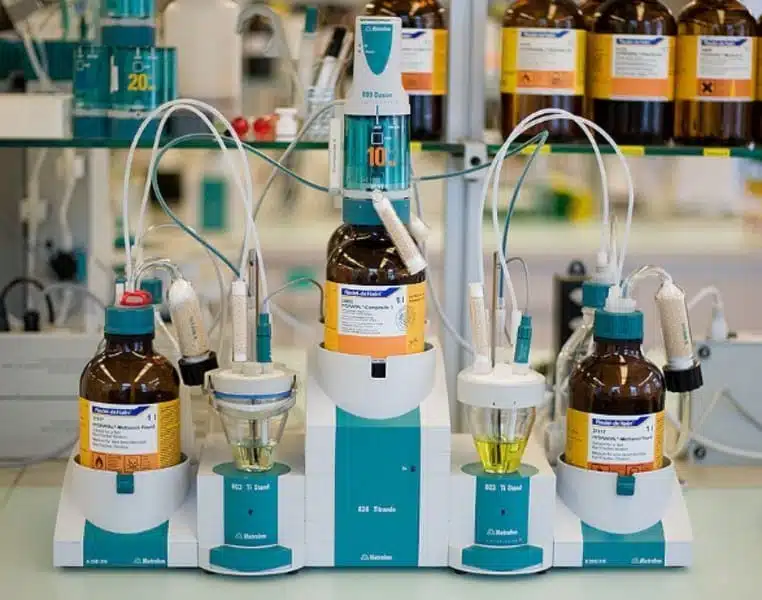What is the Coulometric Karl Fischer titration?
Coulometric Karl Fischer titration – the Karl Fischer method – refers to the quantitative determination of water by titration, i.e. a method that can be used to determine the water content of liquids, solids and gases. The method was developed in 1935 by the German chemist Karl Fischer at Lazăr Edeleanu GmbH.
Theoretical background of the Karl Fischer method
Coulometric Karl Fischer titration involves adding a solution to a galvanically active sample and then measuring the volume of the resulting gas. The result is then compared with the standard value for the respective substance in order to determine the water content. Coulometric Karl Fischer titration offers many advantages over conventional titration methods, especially when measuring small water contents in solid substances.
The procedure consists of titrating water with an anhydrous methanolic solution containing iodine, sulphur dioxide and excess pyridine as a buffer solution. The maximum reaction rate is between pH 5.5 and 8. Accordingly, basic components such as imidazole are used for acidic samples and acidic components such as salicylic acid for basic samples. The amount of water in the sample also influences the molar ratio. However, this only occurs from approx. 1 mol/l of the solvent.
Practical application of the Karl Fischer method
The Karl Fischer method is based on an electrochemical process in which an electrical voltage is first generated between two electrodes in the sample container. This releases ions from the reagent, whereupon a redox reaction takes place in which oxygen molecules are replaced by hydrogen. The resulting electrical signal can be measured to determine the water content of the sample.
Chemical reactions
Sulphur dioxide and iodine only react with each other in the presence of water:
2 H2O+ SO2 + I2 → SO42- + 2 I- + 4 H+ (in the absence of alcohols)
If methanol is present in the solution, it forms an acidic ester with sulphur dioxide, which is neutralized by the base (e.g. imidazole, referred to below as “RN”):
CH3OH+ SO2 + RN → (RNH)-(CH3SO3)
In the titration, in which iodine in methanol is used as the standard solution, the methyl sulphite anion is oxidized to methyl sulphate by the iodine in the presence of water. The yellow-brown iodine is reduced to the colorless iodide: (RNH)-(CH3SO3) + I2 + H2O+ 2 RN → (RNH)-(CH3SO4) + 2 (RNH)-I
If no more water is present, the added iodine is no longer reduced. The resulting brown coloration is used for visual endpoint indication. In practice, electrometric indications (especially biamperometry) are preferred as they are more sensitive and accurate.
Application of Karl Fischer titration in process engineering
Coulometric Karl Fischer titration is a very accurate method for determining the water content in various materials. This technique can also be used to differentiate between similar materials. As it is very precise and can be carried out quickly, it is also frequently used in industrial process technology.
It can be used particularly successfully for the quality control of chemical and pharmaceutical products. One example of this is the quality testing of fuels and solvents, where it is very important that they have a certain water content. The method is also frequently used in the food sector to check the moisture content of products.
Coulometric Karl Fischer titration is also used in other areas: it can be used to check the degree of corrosion of metal surfaces or to determine the water content in construction products or building materials.
Quality control and process management
Coulometric Karl Fischer titration plays a crucial role in quality control and process management in many industrial companies. By accurately measuring the water content, unwanted components can be detected and eliminated in good time, ensuring product quality and enabling cost savings at the same time. It is also possible to use the process to control factors such as temperature and pressure and to avoid or minimize unwanted contamination effects.
Ebbecke Verfahrenstechnik also uses Coulometric Karl Fischer titration as a useful tool for quality assurance and process optimization. Please contact us for further information!
Online source:
https://de.wikipedia.org/wiki/Karl-Fischer-Verfahren, retrieved: January 21, 2023, 11:5o UTC
Literature sources:
1st Karl Fischer titration: Methods for water determination / Eugen Scholz / 2013
2nd Analyst Pocketbook, Volume 15 / Ingo Lüderwald / 2013


















